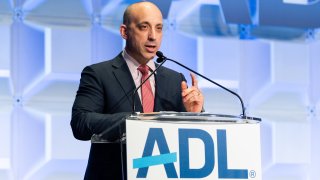
- The Anti-Defamation League unveiled a plan that asks U.S. corporations, government agencies, and non-profits to pledge to fight antisemitism in their workplaces.
- ADL's plan builds on last month's White House pledge to fight the increasing number of antisemitic incidents across the U.S.
- "Jewish people account for about 2% of the population, yet they are the most singled-out victimized religious minority," ADL CEO Jonathan Greenblatt said at a CNBC event on Thursday night.
The Anti-Defamation League is asking American corporations, government agencies, and non-profits to pledge to fight antisemitism in their workplaces, and intends to audit and report on their progress in 2024.
Speaking at a CNBC Workforce Executive Council dinner on June 8, ADL CEO Jonathan Greenblatt said it's time for corporations to tackle the growing problem of antisemitism in the workplace and put measures in place to track progress. The ADL initiative includes addressing antisemitism in diversity, equity, and inclusion programs, supporting employee resource groups or affinity groups for Jewish employees, guaranteeing religious accommodations for workers, and urging companies to use their public platforms to speak out against antisemitism.
"Workplace DEI initiatives are admirable efforts to create fairer workplaces, but for too long, too many have left Jewish workers out of the equation," Greenblatt said. "Corporations should prioritize supporting Jewish employees as much as any other marginalized group."
Get Connecticut local news, weather forecasts and entertainment stories to your inbox. Sign up for NBC Connecticut newsletters.
To address this oversight, he said corporate DEI initiatives should do an internal audit to identify areas for improvement in terms of policies, practices, and company language to make sure they are inclusive.
Employee resource groups not only give Jewish employees an opportunity to share experiences, connect with others, and advocate for more inclusive policies with the company, but they also serve as a valuable sounding board for leaders and for educating non-Jewish employees about antisemitism and how it can manifest in the workplace, he said.
Building on White House efforts
Money Report
Greenblatt said the ADL's plan builds on last month's White House pledge to fight the increasing number of antisemitic incidents across the U.S. He cited a 2022 study that found that more than half of Jewish respondents experienced discrimination at work, a statistic that he said is in line with broader societal trends.
According to the ADL, antisemitic acts surged to historic levels last year, with a total of 3,697 incidents reported across the U.S., an increase of 36% compared to 2021. Businesses represent the fifth-most frequent site where antisemitic incidents take place. "The plan the White House released is extraordinary, but business needs to step up as well," Greenblatt told the gathering of chief people officers and DEI leaders.
While companies spend upwards of $8 billion annually on DEI programs, Greenblatt said Jewish employees are often overlooked. That enables workplace antisemitism to manifest in a number of ways including harassment, microaggressions, and hostility toward Jewish employees. Corporate policies that don't allow time off for holidays or Shabbat observance add to an atmosphere of inequity, he said. And at a time when companies are dealing with declining engagement, productivity, and higher turnover among employees, antisemitic comments and actions only worsen the issue.
Every company involved in the pledge will receive ADL information on antisemitism, religious accommodations, and Jewish culture and contributions. Through ADL's efforts in the Shine A Light campaign, 48 companies have committed to adding or enhancing antisemitism education in their DEI strategies. And in February, the ADL announced a new training program, Antisemitism 101 for the Workplace, to help companies improve their anti-bias curriculum, which more than 50 workplaces have used since its launch.
"Jewish people account for about 2% of the population, yet they are the most singled-out victimized religious minority," Greenblatt said. "Companies are in a position to change that and they want to do the right thing. I'm optimistic that they're going to, and that when we check in with them in a year, we're going to see progress."
To join the CNBC Workforce Executive Council, apply at cnbccouncils.com/wec.






